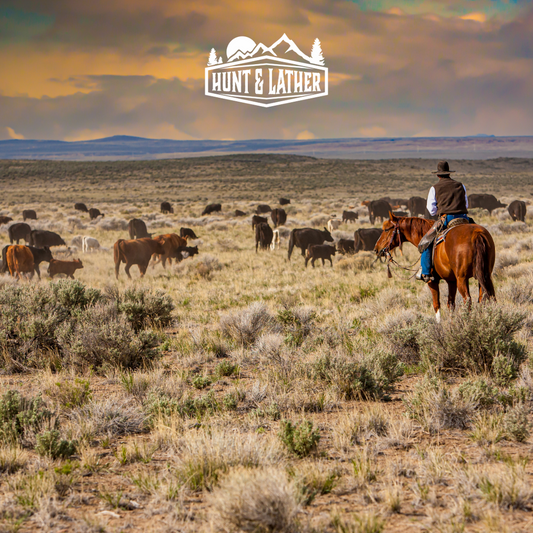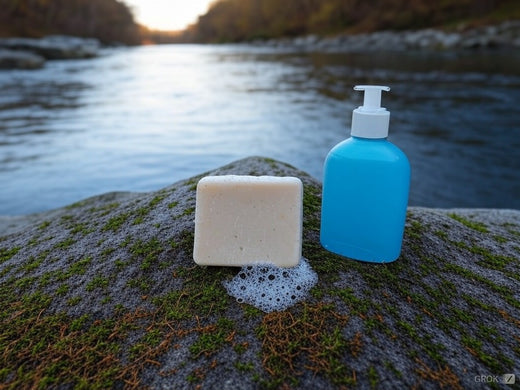We're often asked, "When are you going to offer liquid soaps?" The short answer is... not any time soon. The longer answer is when we can design a liquid soap that aligns with our principles – making real soap, in a form that leaves little mark on the environment, and, of course, includes natural ingredients like tallow.
We can access the world's information with a device in our pocket. We whiz around in electric cars. And we have drugs to treat all ills. But ask yourself, are we doing better? The outdoorsman knows he can feed his family with mass-produced food more quickly and easily than he can harvest game. But in that case, does "cheaper and faster" mean better?
We're all for advancement. But quite often, solutions are really just trade-offs. At Hunt & Lather, we're not willing to compromise principles for convenience. Some things are better left alone.
Cold Process Soap with Natural Fats like Tallow Compared to Body Wash
Most consumers choose between soap and body wash based on convenience. However, there are significant differences in ingredients, manufacturing processes, and efficacy. Here's why cold process soaps, particularly those made with natural fats like tallow, are the superior choice.
What is Cold Process Soap?
Cold process soap making involves mixing oils or fats with an alkali (like lye) at relatively low temperatures, allowing the saponification process to occur naturally over several weeks. This method retains the natural glycerin produced during saponification, which is a fantastic skin moisturizer.
Natural Ingredients:
- Tallow: Derived from beef fat, tallow has been used for centuries in soap making due to its rich content of vitamins A, D, and E, which are beneficial for skin health. Tallow soap is known for its mildness, providing a creamy lather that is deeply nourishing.
- Other Natural Fats: Along with tallow, soaps can include olive oil for its conditioning properties, coconut oil for its cleansing ability, and shea butter for additional moisture. These natural fats contribute to a soap that cleans without stripping the skin of its natural oils.
Benefits of Cold Process Soap with Tallow:
- Skin Hydration: Unlike many commercial soaps or body washes that can be harsh and drying due to synthetic detergents, cold process soap retains fat, which is an excellent humectant. It helps keep skin hydrated, reducing the likelihood of dry skin, eczema, or irritation. Some even believe big soap companies purposefully strip out these fats, only to resell them in the form of "moisturizing" lotions.
- Environmental Impact: Cold process soaps are typically free from the chemicals, parabens, and sulfates found in many body washes. They degrade more naturally, reducing environmental impact. The packaging for soap can also be simpler, often using biodegradable or recyclable materials.
- Longevity and Quality: Cold process soaps cure over time, which not only hardens the bar for longevity but also allows for a more stable, long-lasting product. Unlike many body washes that might degrade over time, real soap gets better with age.
- Rich, Creamy Lather: Tallow provides a luxurious lather that cleans effectively while feeling gentle on the skin. This lather can be richer and more satisfying than the foam produced by many liquid body washes.
Comparing to Body Wash:
- Ingredients: Many body washes contain synthetic surfactants, fragrances, and preservatives that can irritate sensitive skin or cause allergic reactions. Cold process soap, especially with natural fats like tallow, is much more skin-friendly.
- Moisturizing: Liquid soaps often strip moisture from the skin due to their formulation. Cold process soaps, particularly those with tallow, offer natural moisturizing benefits.
- Convenience vs. Quality: While body washes are convenient in terms of use and storage, the quality of ingredients in cold process soaps can provide a vastly different experience, and radically different skin health, especially over time.
- Economics: It’s easy to overuse body wash when it pours from a giant container. Body wash also contains a lot of water, which is both wasteful and heavy to transport. It also contains detergents, which aren't great for the environment. And do you really want to contribute another plastic bottle to a landfill? Add up all of those costs, and then compare body wash to real soap.
The choice here goes far beyond convenience; it's about radically different skin health, environmental impact, and economics. Cold-process soaps bring back traditional methods that respect both your skin and the environment, offering a rich, moisturizing cleanse that modern body washes cannot match. Soap - another one of those examples where "cheaper and faster" certainly does not mean better.




